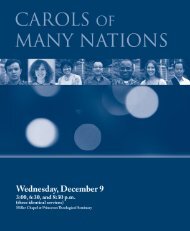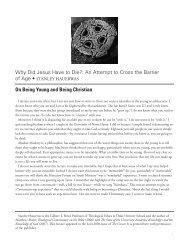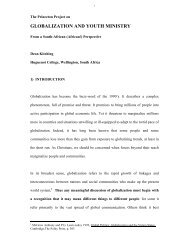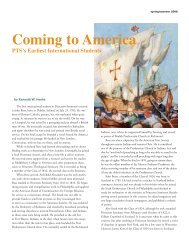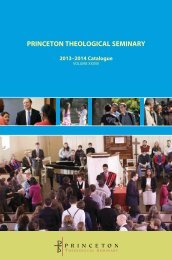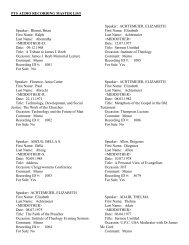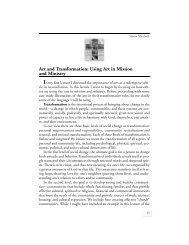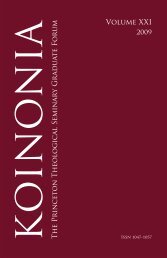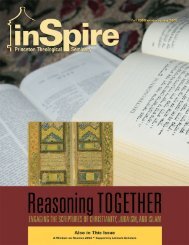P E R S P E C T I VAS - Princeton Theological Seminary
P E R S P E C T I VAS - Princeton Theological Seminary
P E R S P E C T I VAS - Princeton Theological Seminary
You also want an ePaper? Increase the reach of your titles
YUMPU automatically turns print PDFs into web optimized ePapers that Google loves.
Perspectivas/Occasional Papers • Fall 2006Perspectivas/Occasional Papers • Fall 2006This form of what I would call homo-proxy 46 is destructive, resultingin a denial of agency for those who are being represented,reinforcing their under-representation. I intentionally coin theterm homo-proxy here to refer to representation based on anassumption of sameness. The challenge is whether it is possible toexercise a posture of ortho-proxy, in other words to rightly representanother. As Latino/a theologians, our claims for engagementwith our grassroots communities de conjunto, place this concernclose to the center of our commitments. For Latinos/as loss ofagency is not an alien experience, as others, from mostly dominant,non-Hispanic, communities decide to interpret, represent, orintroduce us and our works, ideas, and customs to the greatercommunity. Access means agency, solidarity should not imply aloss of agency. The process of accompaniment employs ametaphor of “walking with” another, not stealing their shoes.Nickoloff rightly points to the power differentials present indeclaring sameness; sameness in the hands of the powerful canbecome co-optation, and not a source of liberation. Unfortunatelythe move from common to normative is also concealed in theassimilation discourse of scholars such as Samuel Huntington. Iam skeptical of propositions with the potential to ignore, obfuscate,and minimize the contextuality of our individual and communallives ultimately leading to a blurring of identities that thoseof us in marginalized communities have struggled to articulateand get taken seriously, in the academy, church and society.Roberto Goizueta communicates well this frustration:At the very historical juncture when Latinos andLatinas are asserting our historical subjectivity and thevalue of our own experience as locus theologicus, weare now advised that the historical subject does notexist and that value is an arbitrary, artificial construct.At the very historical juncture when we are articulat-96ing and developing a theological language that willallow us to enter into ‘rational discourse’ with thechurch and academy, we are advised that reason doesnot exist, only intuition, ambiguity, and irrationality. 48The context for the construction and reconstruction of identityby Latinos/as has changed dramatically in the past thirty years.Statistics indicate the time has come to redefine our understandingsof ourselves as comunidad. One in seven persons in the U.S.is Hispanic. Immigration and higher birth rates have madeLatinos/as the largest racial/ethnic minority community in theUnited States. And it is estimated that in the next few decades,Hispanics will constitute a quarter of the U.S. population. SinceLatinos/as are already the largest population in the U.S. CatholicChurch it would not be in our best interests to pursue commonalityat the very time that the particularity of our Hispanic differencemight well be the norm, especially when curre n tconstructions of common lack any hint of sabor latino. How doesa once minority community avoid becoming a marginalizedmajority in its own church, or eventually in its own nation? In atwist on assimilation, these demographic shifts may suggest whatEd Morales calls the “contradiction of miscegenation as a potentialsolution” in other words that North America is beginning “itslong-overdue process of assimilation into the greater Americanhemisphere.” 48Nickoloff’s invitation to consider what makes us common isnecessary when one takes into account the damage that has beendone when communities and nations isolate differences. Thegenocides of the twentieth century should temper any naïveappropriation of identity politics. However I have difficulty reconcilingNickoloff’s admirably nuanced handling of commonalityin service to liberation with, for example, Samuel Huntington’sfrightening assimilation rhetoric. The common in the hands of97



